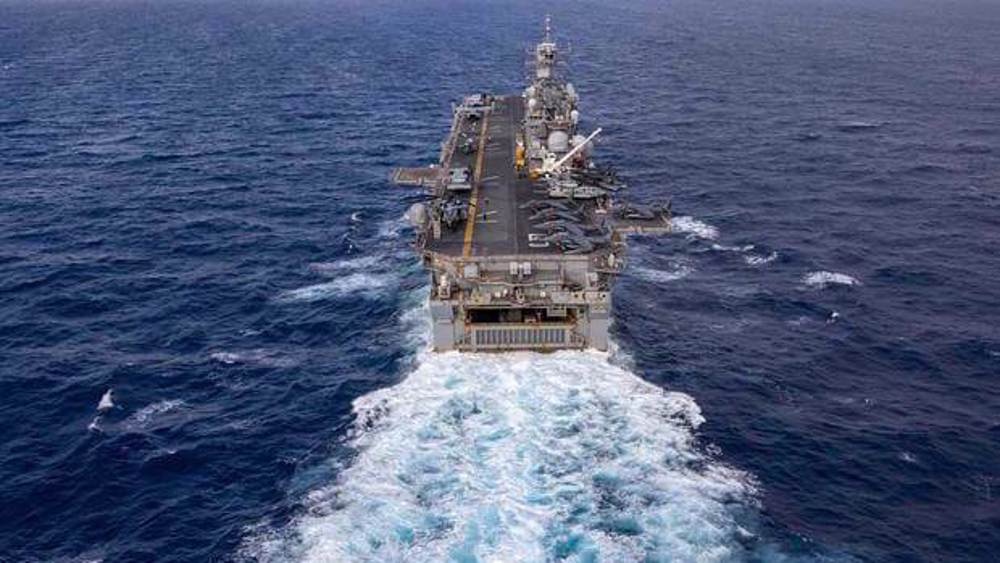Iranian military forces confronted a U.S. Navy destroyer in the Gulf of Oman on Wednesday, reportedly issuing warnings for the vessel to steer clear of waters that Tehran claims as its own.
According to Iranian state media, the encounter occurred mid-morning and marked the latest in a series of confrontations between the United States and the Islamic Republic.
This is coming on the heels of last month’s violent escalation involving Israel and Iran.
As reported by Iran’s state television, a helicopter operated by the Iranian army conducted a flyover of the USS Fitzgerald at approximately 10:00 a.m. local time.
The Iranian report stated that the American warship was attempting to move toward waters under Tehran’s jurisdiction when it was intercepted.
The helicopter crew reportedly communicated with the destroyer, warning it to divert its course and avoid what Iran refers to as its sovereign waters.
The Iranian broadcast claimed that the U.S. destroyer initially issued retaliatory warnings, but the Iranian pilot repeated the order to stay out of Iranian-controlled waters.
Ultimately, the report said, the U.S. vessel complied by altering its path.
The U.S. Navy has not issued a formal statement on the incident as of yet, and independent verification of Iran’s account has not been provided.
Iranian state TV also aired a video that appeared to be filmed from the cockpit of a military helicopter.
In the footage, a voice, allegedly that of an Iranian pilot, is heard instructing the American destroyer to change course and avoid infringing on Iranian territory.
A large ship can be seen in the video, though its identification as the Fitzgerald has not been independently confirmed.
This naval incident comes in the wake of a recent flare-up in hostilities between Iran and the United States.
Both countries were themselves sparked by an earlier 12-day air conflict between Israel and Iran.
During that conflict, U.S. forces joined Israeli efforts and reportedly targeted Iranian nuclear enrichment sites.
In retaliation, Iran launched a missile attack on a U.S. military base located in Qatar.
The Gulf of Oman, along with the nearby Strait of Hormuz, has frequently been a flashpoint in U.S.-Iran relations.
Tehran has often accused American naval forces of operating too close to its territorial waters.
In 2023, for instance, Iran claimed to have forced a U.S. submarine to surface as it crossed the Strait of Hormuz, though the U.S. denied this account.
In addition to military tensions, diplomatic efforts between the two nations remain fraught.
Prior to the June conflict, Washington and Tehran had resumed intermittent negotiations over Iran’s nuclear program.
The United States and its ally Israel have long alleged that the program is designed to produce nuclear weapons, an accusation Iran denies.
Tehran insists its nuclear efforts are strictly for peaceful purposes, such as energy production.
However, international skepticism has grown, especially in light of Iran’s recent actions.
The country has enriched uranium to levels that experts say are unsuitable for civilian energy use.
It has also reportedly obstructed inspections by international monitoring agencies.
Iran has reportedly continued to enhance its ballistic missile program, all of which raise alarms about the true intentions behind its nuclear activities.
Wednesday’s naval episode adds a new layer of complexity to the already strained relations between Washington and Tehran.
While such encounters have occurred in the past, they are now playing out against a backdrop of increased military engagements and diplomatic breakdowns.
Each side appears to be sending a message, not only to one another but also to the broader international community: that control over this strategically vital region remains a high-stakes geopolitical contest.
As of now, it remains to be seen how the United States will respond to Iran’s claims, and whether the incident will escalate further or be managed through behind-the-scenes diplomacy.
But with tensions running high and past efforts at de-escalation largely unsuccessful, the risk of miscalculation continues to loom large in the region.







